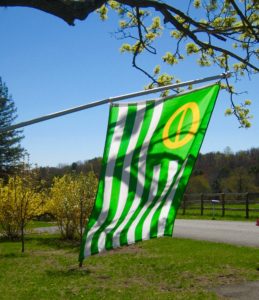
– Photo by Jan Ketchel
To own is to take full possession of that which truly belongs to oneself. If a child dreams of her enraged father at her bedroom door with a club in his hand, this dream originates in her own psyche; she completely owns the dream, it is her dream and nobody else’s.
Regardless of the meaning and outer causes of the dream, the dream, with its inner impact upon her, is her personal experience, constructed and completed within the boundaries of the self. The child must assume full ownership of her dream. The experience of the dream may take her years to fully integrate, but the experience is forever a fact of her life, a part of herself which must be reckoned with and given its rightful place within the inner boundaries of herself.
If, in a waking state, that same child is confronted by her enraged father at her bedroom door in reality, her inner experience of this rattling intrusion is hers and hers alone too. The experience is fully recorded within herself and lives on within herself as a psychic content that beckons a legitimate place among the many other psychic contents of experiences that reside within her. Though in both cases a person beyond the boundaries of herself is implicated, that is her father, and indeed some outer actions and interactions may be necessary, her actual experience in both situations and how it is represented within herself is hers and hers alone. No one can tell another person what their inner experience is or should be; it is fully what it is within the person who is having or has actually had that unique inner experience.
Experience is. It happens. Like nature, experience takes us into the unknown, the unexpected, the dangerous, the terrifying and the spellbinding. Experience leads us into the unfathomable depths of our own nature, to places, emotions, sensations and thoughts we may have no preparation for. In one instance we may experience bliss, in another serious loss. Experience itself is unconcerned with whether something is good or bad, right or wrong—it simply happens. We of course must apply a judgment dimension to our experiences in an attempt to make sense of them. Without sense we have no order, and without order there is no definite self, and without self there is chaos. Chaos within the psyche results from a logjam of undigested experiences.
We must decide if an experience is right or wrong, good or bad, appropriate or inappropriate, acceptable or unacceptable. All these parameters help us to quantify and qualify an experience, to truly ‘know’ our experience. These are the operating tools of the rational mind, the foundation of our consciousness. Unfortunately, as helpful as these conscious tools are, helping to stabilize and navigate our consciousness, they can have the unfortunate side effect of distancing us from the fuller impact of the experience, which transcends the ordering function of the rational mind and continues to haunt the self in some form of psychic or physical symptom.
We must reckon with the full impact of an experience to be freed of such antagonistic symptoms as anxiety and fear, which may actually be placeholders of our disowned experiences, discontented prisoners within the self.
The psyche might also be riddled with obsessive anger and blame as it locates the responsibility for its experiences in the person of an outside perpetrator, or some permutation thereof. Of course responsibility must be assigned where it is due and appropriate action be taken to address or redress an act, but inner reconciliation with one’s experience requires full ownership of one’s experience as one’s own, regardless of the sources or players involved in setting the stage for one’s inner experience.
Shamanic recapitulation and EMDR are two practices that enable one to fully assimilate and own the deeper impact of an experience. Both techniques incorporate psyche and body to facilitate assimilation.
C. G. Jung observed that we internalize the soul of the land we inhabit. For America, that means that the American soul is Native American. Carlos Castaneda gifted us the practices of the shamans of the Americas, in particular the breathing practice of recapitulation. Francine Shapiro, founder of EMDR (Eye Movement Desensitization & Reprocessing), discovered the bilateral movement of recapitulation, I imagine, through the Native American soul of America that projected itself onto her unique discovery process.
Reliving one’s life experiences while bilaterally breathing from side to side is the simplest gift from the native soul of America. With this simple breathing practice we consciously put our houses in order, fully own our experiences and, relieved of the tension of them, we are prepared to fully engage in new life and new experiences, all energy on board for new adventures.
Assuming full responsibility for one’s own experiences provides a most powerful container of self, from which we are empowered to reconcile life lived and release the self to fully enter new life unburdened, with fluidity, totally freed and ready for new adventures!
Owning the experience,
Chuck





